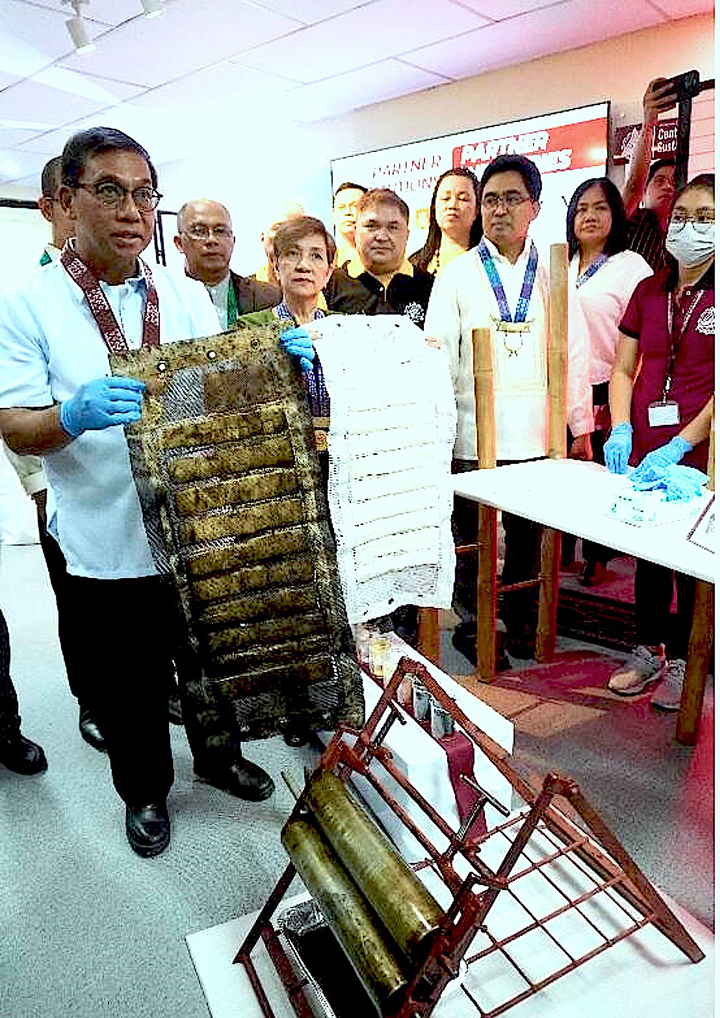The Philippines may soon have technology clean up oil spills, like the one in Oriental Mindoro in February, with the “CocoFlexSorb” that was developed at the Mindanao State University-Iligan Institute of Technology (MSU-IIT).
The bio-based polyurethane foam was developed through the Balik Scientist program of the Department of Science and Technology (DOST). It was unveiled to the public on May 11, according to a press release from the DOST-Philippine Council for Industry, Energy and Emerging Technology Research and Development (DOST-PCIEERD).
Unlike those available in the market, CocoFlexSorb has superior oil absorption capacity and can absorb different types of light oil, vegetable oil, kerosene, motor and bunker oil, DOST-PCIEERD said.
CocoFlexSorb can also be reused 40 times and is not harmful to the environment.
The technology was used during field trials in Occidental Mindoro with the Philippine Coast Guard in May. It showed promising results, indicating that this technology could be a solution to an oil spill problem.
However, more testing and development is needed before the technology can be adopted and commercialized, DOST-PCIEERD said.
“The development of eco-friendly and cost-effective polymers derived from natural sources holds promise for mitigating the impact of oil spills,” said Dr. Arnold A. Lubguban, DOST Balik scientist and MSU-IIT Center for Sustainable Polymers project leader.
“With this achievement, we hope to inspire researchers to continue investing in innovative technologies and collaborations to work towards a cleaner and healthier environment,” Lubguban added.
Scientific Secretary Renato U. Solidum Jr. said, “DOST is very proud of MSU-IIT’s achievements with its collaborative efforts with industry.”
“DOST is steadfast in pushing the industry through continuous R&D to enable technological advancement. Innovations like the CocoFlexSorb offer Filipinos options for a better life, such as clean water and an environment healthy environment,” added Solidum.
The technology was developed from the DOST-Niche Centers in the Regions for R&D (Nicer) Center for Sustainable Polymers program at MMSU-IIT.
The innovation center opens on May 10, showcasing three product lines, DOST-PCIEERD said.
First, rigid insulation foam panels designed for the building and construction industry, targeting the segment that prioritizes sustainable and eco-friendly materials.
It is the first of its kind to use polyols derived entirely from coconut oil, without any petroleum substitutes.
Second, viscoelastic foams, a bio-based alternative to commercially available “memory” foams. It has a higher density than conventional foams and possesses the distinctive characteristic of memory foams: slow recovery.
Third, superoleophilic foams that have shown potential to absorb numerous types of oil. The material has been shown to have high affinity and absorption capacity in bunker oil, fresh and used motor oil, kerosene and vegetable oils.
It is hydrophobic in both fresh and salt water and has superior reusability as its oil absorption capacity does not decrease with use.
DOST has been funding universities like MSU-IIT through the Nicer program to empower higher education institutions in the regions to significantly enhance regional research by integrating their development need with existing R&D research capabilities and resources.
It has been providing institutional grants for R&D capacity building to improve its scientific and technological infrastructure.
Undersecretary for Science and R&D Leah J. Buendia said, “We must develop the nation’s innovation and entrepreneurial ecosystem through linkages between academia, industry and government. This translates into product and service upgrades at our local businesses.”
Buendia also noted, “The advances at MSU-IIT are the perfect example of the harmonization of our resources combined with the support given to our Filipino scientists.”
Image credits: DOST-PCIEERD


